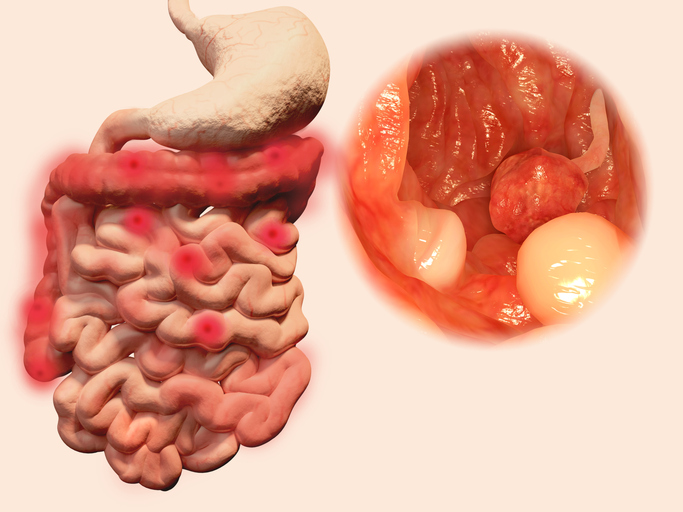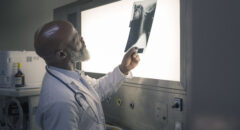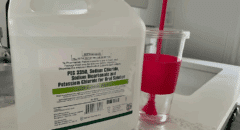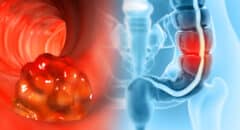
When most people think about cancer in women, breast and ovarian cancer are usually the first two that come to mind. Many are actually surprised to learn that colorectal (colon) cancer is the third most prevalent cancer among women (behind breast and lung) and the second most deadly cancer in women. With over 60,000 cases of colorectal cancer diagnosed annually in American women, we really need to shine more of a light on this highly preventable and easily diagnosed disease.
READ: Colon Cancer Rates Are Rising In People Under 50
Let’s be honest though. While no one really likes to discuss cancer in general, there is a particular aversion to talking about colorectal cancer. So, why all of the stigma when it comes to colorectal cancer and colorectal health? Much of it has to do with the fact that colonoscopies, while more popular than Congress according to recent polls, are still not on people’s top 10 list of favorite things to do. Add to this the fact that discussions about what our bowels may or may not be doing just isn’t something that most people consider polite conversation and you have our current situation.
For women in particular, this lack of colorectal health awareness is further compounded by the fact that medical research frequently focuses on men and the fact that women have a tendency of putting their own healthcare needs behind those of everyone else in their household.
So, let’s talk about colorectal cancer, ladies.
We have already established that colorectal cancer is the third most common cancer in women and the second most common cause of cancer deaths in women. The good news is that there are things that we all can do to reduce our risk of developing colorectal cancer and there are tons of highly effective screening options available to aid in early diagnosis.
Controllable Risk Factors
So, what are some things that we can do to reduce our risk of colorectal cancer? Well folks, there is no easy way around it, there is no magical pill and there is no quick fix. Lifestyle always comes heavily into play in matters of health and prevention, and colorectal cancer is no different. There are certain lifestyle changes that every woman (and man) should consider for overall health and thankfully many of these also improve colorectal health.
- Increase activity and exercise: Obesity and sedentary lifestyles have both been shown to increase the risk of colorectal cancer. I’m not advocating that we all become marathon runners or spend four hours a day in the gym, in this case little changes actually make big differences. Spending as little as thirty minutes a day participating in mild to moderate physical activity (i.e. good brisk walks) have been shown to improve overall health and colorectal health.
- Smoking cessation: I know that this point is hammered home at every doctor’s visit (or at least it should be) but call me the Dr. Carpenter because I’m going to hammer it a little bit more! The number of diseases that smoking is directly responsible for or contributes to is gargantuan and you can add colorectal cancer to that extensive list. Studies have shown an up to 60% risk increase in colorectal cancer among smokers.
- Limiting alcohol intake: Now, I know a lot of you probably just thought about turning your computers off but bear in mind that I said limiting not stopping. Common convention has long held that two alcoholic drinks per day is the acceptable upper limit before there is an increase in the risk of developing colorectal cancer. This number however was derived from studies looking at men and subsequent research has suggested that this number is more like one alcoholic drink per day for women. This doesn’t mean that women can’t ever have more than one drink on a given day, it just means that more than one drink per day on a regular basis is not advisable.
- Diet also plays a role: Like many other disease states, a diet rich in red and processed meats as well as deep fried and fatty foods also increases the risk of colorectal cancer. This doesn’t mean that you can’t ever eat any of these foods, it just means that we need to limit overall intake of these types of foods. Now I just warned you about deep fried and fatty foods and here I am about to tell you to avoid grilled meats as well! Grilled meats and specifically those that are grilled to a char also increase the risk of all GI cancers including colorectal cancer. Once again however, it’s an issue of balance. Grilled meats in general are fine we just need to limit consumption of overly grilled/charred meats to no more than a few times per grilling season. On the flipside eat as many fruits, vegetables, grains and fibers as you want as all of these have been shown to reduce the risk of colorectal cancer.
Intrinsic Risk Factors
So, we have discussed those extrinsic risk factors, the ones that we have the power to change. What about those risk factors that are intrinsic to us?
Age is a risk factor for colorectal cancer. The older you get the higher your likelihood of developing colorectal cancer.
A personal history of polyps in the colon as well as inflammatory bowel disease (Crohn’s disease and ulcerative colitis) also increases your risk of developing colorectal cancer as does a family history of colorectal cancer, adenomatous polyps of the colon and relatively rare inherited disorders like Lynch syndrome and familial adenomatous polyposis. Despite the existence of risk factors that we just can’t change, controlling those risk factors that we can change combined with colorectal cancer screening still allows us to lower our overall colorectal cancer risk significantly.
Early Diagnosis
Now that we know some things that we can do to reduce our risk of developing colorectal cancer, we need to talk about what we can do to catch colorectal cancer early if, despite our best efforts, we still develop the disease. We are lucky to have a wealth of readily available effective screening options.
Now for those of you who I didn’t lose at the alcohol reduction part of the conversation, this is where I tend to lose the rest of you. Please just stick with me a little longer because it’s not all bad. When you mention the C word (in this case I am talking colonoscopy), lots of people mentally checkout. Keep in mind, however, that while effective, colonoscopy is not the only screening tool.
Colonoscopy: Is a safe and simple outpatient procedure and most patients report that they are actually surprised by how relatively not unpleasant (it would probably be a bit of a stretch to say pleasant, but you get the point) it actually is. Due to the joys of modern anesthesia, most folks snooze right through the procedure (conscious sedation) and many don’t even remember much of what happened after its over. Many consider colonoscopy to sill be the best screening method because of it’s ability to visualize the entirety of the colon and allow for on-the-spot removal of potentially concerning lesions. There are however folks that absolutely refuse to have a colonoscopy and thankfully there are other effective and less invasive options.
Flexible sigmoidoscopy: As the name suggests, flexible sigmoidoscopy utilizes a flexible camera to evaluate only the lower part of the colon known as the sigmoid colon. Because the sigmoid colon is closest to the rectum, this option is less invasive and takes less time to perform. While it does not allow you to see the entirety of the colon, the sigmoid colon is where the highest percentage of colon cancers originate so for those uncomfortable with the idea of having the entire colon viewed, sigmoidoscopy gives you the most bang for your buck.
Fecal occult blood testing (FOBT): FOBT includes both traditional Guiac testing and the newer fecal immunochemical tests (FIT) Both tests evaluate the stool for blood that is invisible to the naked eye which is important because the majority of colorectal cancers will bleed even though early on the blood is not visible to the naked eye. Due to it’s improved sensitivity, FIT testing is rapidly replacing traditional Guiac testing and both tests have the benefit of being noninvasive (the patient just places a stool specimen on card) and both can be done in the privacy of one’s own home.
Stool DNA testing: This is a newer method that actually examines the stool for certain DNA changes that are usually seen in colorectal cancers. The only drawback is that it is not sensitive for adenomatous polyps (a type of potentially precancerous polyp in the colon). Much like fecal occult blood testing, stool DNA testing has the benefit of being able to be done in the comfort and privacy of your own home.
Pill cam: This is a much less invasive form of colonoscopy in which the patient actually swallows a pill that houses the camera. This allows the entire GI tract from mouth to anus to be visualized which is of course a good thing. The major drawback to the pill cam is the fact that unlike traditional colonoscopy, polyps or lesions that are seen on the pill cam cannot be removed which means that abnormal findings will need to be followed up with a traditional colonoscopy.
CT colonography: CT colonography is a method for colorectal cancer screening that uses a special type of CT technology to look at the colon. The CT colonogram provides a view of the entire colon but much like the Pill Cam, any abnormalities seen will need to be followed up and resected by traditional colonoscopy.
Knowledge is power and you now have the knowledge to take power over your colorectal health and to help change the narrative about women, colorectal cancer prevention and screening. I know that discussing colorectal health will never be as socially acceptable as discussing other health matters ,but if each person who reads this piece makes positive changes in their own lives and shares this piece with just one other woman that you care about we can tackle colorectal health two at a time!
 Idries J. Abdur-Rahman, MD, FACOG is a board certified Obstetrician/Gynecologist. He practices alongside his twin brother Dr. Jamil (who is also a board certified Obstetrician/Gynecologist) in the Northwest Suburbs of Chicago. Dr. Idries is a married father of two son’s and three daughters and he is an avid traveler and runner. Learn more at TwinDoctorsTV.com.
Idries J. Abdur-Rahman, MD, FACOG is a board certified Obstetrician/Gynecologist. He practices alongside his twin brother Dr. Jamil (who is also a board certified Obstetrician/Gynecologist) in the Northwest Suburbs of Chicago. Dr. Idries is a married father of two son’s and three daughters and he is an avid traveler and runner. Learn more at TwinDoctorsTV.com.









